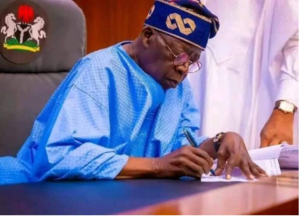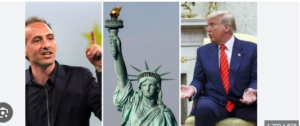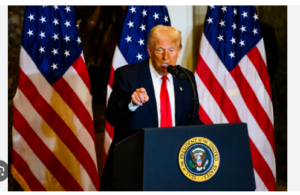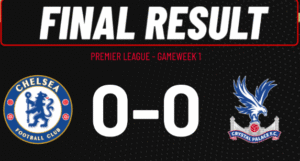
Before anything else, the narrative horrified me as a professional. The day it was published, I harped on my social media post about how it lacked evidence, a basic need of journalism.
The Daily Trust newspaper finally issued a public apology to the Federal Government on Wednesday, October 2, for its inaccurate reporting on July 4th on the Samoa Agreement. It provided much-needed resolution to a sensitive issue. The actions taken by the management of Media Trust are praiseworthy. Not everyone possesses the humility to own up to their mistakes. This has now resolved the issue and destroyed the baseless accusations included in the story in question.
According to the flimsy main article on July 4, the Federal Government signed the Samoa Agreement with the European Union (EU) on behalf of LGBTQ rights, together with other countries that make up the Organisation of African, Caribbean and Pacific States, or OACPS. The report made it more scandalous by associating it with hypothetical advantages of $150 billion. Surprisingly, neither of the allegations is supported by any evidence in the story. There couldn’t have been because the large international document made no reference of either $150 billion or the LGBTQ community, or anything like it.
Daily Trust apologised and stated that it fully agreed with the decision made by the impartial panel that the Nigerian Media Complaint Commission (NMCC) had assembled. The panel’s conclusion, which was made public on September 23 after it examined the Federal Government’s complaint, was categorically clear. The NMCC concludes that there is no provision in the 403-page Samoa Agreement compelling developing and underdeveloped countries to back the calls for recognition made by the Lesbian, Gay, Bisexual, Transgender, and Queer (LGBTQ) community in exchange for financial or other forms of assistance from developed countries. In fact, the pact makes no mention of the LGBTQ community at all.

Before anything else, the narrative horrified me as a professional. The day it was published, I harped on my social media post about how it lacked evidence, a basic need of journalism. That’s a comment I could have made in a non-government capacity as well. To be honest, I’m still amazed at how the story made it past the editorial crunch in the Trust newsroom, where I had worked.
As anticipated, the tale incited resentment. Mostly because the news originated from a publication reputable for its journalism, tongues were wagging. Everyone accepted it as gospel truth, with the exception of astute experts. Fortunately, or not, the story came out on a Thursday. Due to its socio-religious sensitivity, it became the talk of the town almost immediately, particularly in the Muslim North. Our beloved imams were furious. Since Trust was the source of the narrative, I don’t blame them!
As if the rage wasn’t enough, other opponents added more fuel to the fire when it broke out. Overnight, they mobilised religious leaders to publicly criticise the administration. Armed only with misinformation, the majority of the imams arrived to the minbar the following day, writhing with rage. They unleashed a barrage of criticism directed at a government that, in their opinion, was now “courting calamity greater than the economic hardship” on its citizens. The administration, President Tinubu, and all of us who collaborated with it came under fire for allegedly “selling out the country to promoters of LGBT.” It was said that the government could do anything for money. Worried, the faithful departed from the mosques.
In the days that followed, experts and media outlets—some of which are well-known for being harsh critics of the current government—came forth to criticise the reporting for being unworthy. The Nigerian Bar Association (NBA), Professor Farooq Kperogi, Dr. Suleiman A. Suleiman, a Daily Trust columnist, the BBC, PREMIUM TIMES, The PUNCH, and others all declared their unequivocal opposition to the Daily Trust report through fact-checks or assessments. Given that the paper’s errors were clearly identifiable, the expectation was for a concise and prompt retraction. The publication continued despite conceding “lapses in our reporting,” encouraged by the heartfelt sermons and partisan backing from some quarters.
Following the uproar, we made a lot of effort to refute the Daily Trust story’s authors’ desire for Nigerians to think there was a wolf around the Samoa Agreement. I enquired, “In what ways had the agreement changed Nigerian laws regarding LGBTQ issues?” What are the real-world consequences that suggest support? I got curses, rather than answers. It hurt to watch so many people, particularly in the North, reject logic and accept the twisted narrative that didn’t even cite a single clause from the accord to back up its assertions.

Even though it was frustrating, I didn’t hold the clergy or the general public responsible for the severe verdict. The onus of responsibility was entirely on Trust. And this is what this post-mortem essay aims to do. Journalistic abilities are similar to a gun-wielding soldier’s. If the trigger is released in the incorrect direction, innocent people could be killed or seriously injured, and no amount of regret or even reprimanding the offender could make up for the harm done. For this reason, the adage “if in doubt, leave it out” remains timeless when it comes to journalism practice. As experts, we are well aware that a retraction or rebuttal can never have the same impact as the original. Numerous individuals remain in the world whose from opinions have been established from the first story, they won’t alter.
Because of this, ethical journalism cannot be compromised. As the venerable Philip L. Graham, publisher of The Washington Post, famously said, “Journalism is the first rough draft of history.” That draft frequently sticks, even when later circumstances refute its assumption.
Yes, a strong democracy requires accountable media. He who comes to equity, though, must come with clean hands, according to a legal maxim. The term “accountability journalism” does not equate to “throwing stones,” as doing so really does more harm than benefit. Ensuring the sanctity of truth, justice, and the public welfare is imperative at all times. According to renowned American combat correspondent Edward R. Murrow,
“We must be truthful in order to be credible.”
The grand Sardauna, Sir Ahmadu Bello, once advised the founding team of the New Nigerian newspapers, saying, “Tell the truth about us, tell us the truth about others.” With that, I’ll end. We make no further requests.








